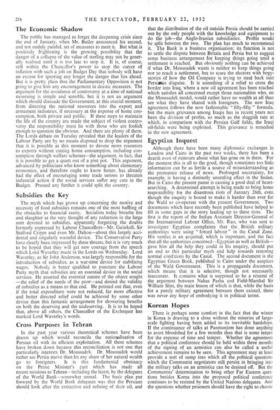Cross Purposes in Tehran
In the past year various theoretical schemes have been drawn up which 'would reconcile the nationalisation of Persian oil with its efficient exploitation. All these schemes have broken down because this reconciliation is not one that particularly interests Dr. Moussadek. Dr. Moussadek would rather see Persia starve than let any share of her natural wealth go to foreigners. . It is this fundamental obstinacy on the Prime Minister's part which has made all recent missions to Tehran—including the latest, by the delegates of the World Bank—somewhat unreal. The basic plan put forward by the World Bank delegates was that the Persians should look after the extraction and refining of their oil, and that the distribution of the oil outside Persia should be carried out by the only people with the knowledge and equipment to do the job—the Anglo-Iranian subsidiaries. Profits would be split between the two. The plan has much to recommend it. The Bank is a business organisation; its function is not to settle the dispute between Britain and Persia but to suggest some business arrangement for keeping things going until a settlement is reached. But obviously nothing can be achieved if what Dr. Moussadek wants is neither to keep things going nor to reach a settlement, but to scare the electors with bogy- stories of how the Oil Company is trying to steal back into Persistkin disguise. It is something of a relief to cross the border into Iraq, where a new oil agreement has been reached which satisfies all concerned except those nationalists who, on the Moussadek model, would rather have no wealth at all than see what they have shared with foreigners. The new Iraq agreement, follows the now fashionable " fifty-fifty " formula, but the main grievance among Iraqis has in recent years not been the division of profits, so much as the sluggish rate at which, in comparison with the Persian Gulf fields, the Iraqi oil-fields were being exploited. This grievance is remedied in the new agreement.


































 Previous page
Previous page